Model UN has taught me many things. Current events, speaking skills, and interpersonal skills top the list, as expected. But, as I’m sitting here writing an essay on Victorian literature for an English AP class, something occurred to me: Model UN has had a profound impact on the way that I write.
My first few conferences my freshman year were largely spent watching. Watching the upperclassman delegates that I respected the most, and trying to learn the MUN tradecraft. I learned many things this way: effective resolution writing, strategies for debate, etc. But, while watching, I noticed something weird, that I’m sure all delegates have seen at some point. Let’s say we have two delegates, Delegate A and Delegate B. Delegate A clearly knows more about the topic than Delegate B. Both of them are speaking very frequently in committee, and, because of his/her research, Delegate A’s arguments are more factually substantive than Delegate B’s arguments. For some reason, however, everybody listens to Delegate B more, and he eventually leads the bloc that writes the resolution that gets passed.
Here’s my take on this situation:
Success in Model UN is all about finding and being comfortable with your own voice. Delegate A knows more and has more feasible solutions, but when he speaks, it seems like he’s uncomfortable, as if Model UN is an awkward second language to him. Delegate B, however, seems like he is right at home debating in foreign affairs, which attracts approval from the committee. This reminds me of what I tell delegates in my school’s Model UN team about Western Business Attire: “more important than what you wear is how comfortable you look: make it look like you dress like this every day”.
As I grew into Model UN, I like to think that I have developed this comfortableness in my speaking style, as I became better at delivering speeches, controlling caucus, and navigating blocs.
This brings me back to this essay that I’m writing. When I read some of my peer’s essays, they sound like Delegate A: they are well researched and knowledgeable, but it is immediately clear to me that this topic is actually foreign to them, that they have moved well out of their area of expertise. I notice a remarkable difference when I read the essays of my Model UN friends: they seem entirely at ease in their writing, as if they were a wise professor of Victorian Literature at an Ivy League university.
This ease of writing style makes the ideas in the essay more credible and persuasive. All of a sudden, it doesn’t feel like you are reading a high school student’s cookie-cutter literary analysis. What you’re reading more closely resembles a paper that would be found in a literary journal, which asserts ideas that, even if they are exactly the same, are far more compelling than those in the non-Model-UN student’s paper. For example:
Non-Model UN Student Essay: Hardy uses ethereal imagery and diction to tell the reader that Tess is now in a dream-state.
Model UN Student Essay: Hardy’s usage of ethereal diction and language lulls the reader into the dream-state in which Tess now exists.
The ideas here are exactly the same, but the second essay feels more organic, and less high-school-y. The second essay demonstrates a proper assumption of the role of expert, using the relevant language style that matches that role. The first one is more stilted, and less convincing. This subtle change can make a huge difference in how writing is perceived.
Model UN teaches students to be temporary experts, to be confident in your positions even though you have done (maybe) a few months of research, and debate only for a few days. It teaches students that professors and internationally known figures aren’t the only ones who are allowed to have an assertive opinion. It teaches students that, no matter whom they are, their voices deserve to be heard. And, when they are writing English essays, college essays, articles for a newspaper, or even an article for Best Delegate, this confidence will elevate their writing, and turn some heads.



